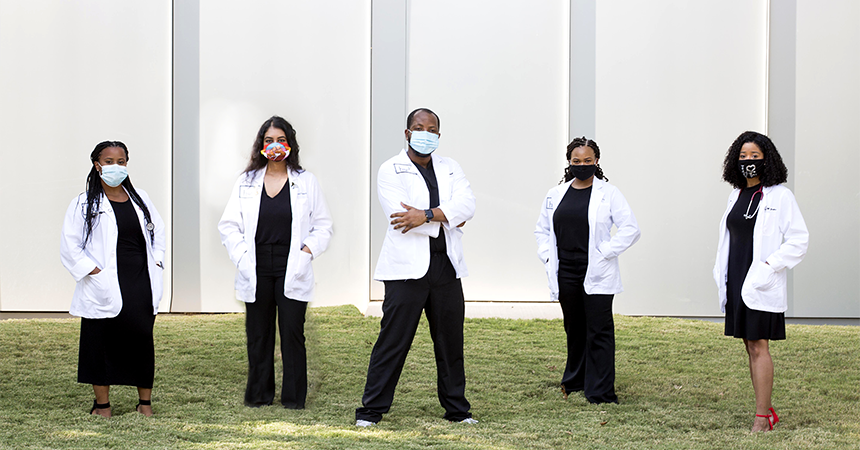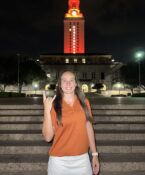TCOM students balance study, family and service during global pandemic
By Diane Smith-Pinckney and Sally Crocker

It’s been more than a year since U.S. communities first heard the term COVID-19. After months of masks, social distancing and creation of vaccines, what began as a medical mystery continues as a global war against a virus.
Doctors, nurses and other medical professionals serve on the frontlines – caring for the sick and consoling those who lost family members.
At the Texas College of Osteopathic Medicine (TCOM), tomorrow’s doctors balance study, family, service and advocacy amid this pandemic. These have been long, trying months – ones in which medical students found themselves delving deep within for strength to overcome personal fears and challenges.
COVID-19 hit too close. Some students worried about parents or relatives who tested positive for the virus or ended up in an Intensive Care Unit. Others mourned.
As this global war against COVID-19 continues, several students of medicine said they are answering a call to serve with a renewed sense of purpose. They are fighting a virus with a focus on helping communities while bridging health disparities and attacking racism.
Five third-year TCOM students began 2021 by sharing their feelings and reflections with the HSC family.
Adjusting to the pandemic
Daeija Lewis prepared for board exams and clinical rotations while being in complete isolation. She had grown comfortable studying at the campus library, but COVID-19 interrupted her routine.
Lewis pushed through online classes and study. She took the boards and when she looked up from her classes, she noticed a different world – one that was experiencing one of the biggest medical challenges of her time.
“The pandemic has caused me to realize that life as we know it can change quicker than our minds can adjust,” Lewis said. “It was and still is a hard accommodation. I don’t know what the future holds, or how I will have to further adjust to it.”
Lewis tells herself she must be flexible enough to respond to emergency situations. This pandemic taught her that she is not immune to the trials the world faces. In fact, she needs comfort even as she gives it.
“One of the things I still think about often is my father having COVID-19,” Lewis said, recalling how she checked in with her family while studying for board exams. “… My dad didn’t tell me that he not only contracted the virus, but he had to be in the ICU for multiple days and still needed nursing visits when he got home. He said he wanted me to focus on school and not worry. It absolutely broke my heart to have someone I love shield me from a difficult time in their life.”
‘Tearing down barriers’
Crystal Cassimere is among the hundreds of thousands of Americans who have lost loved ones to COVID-19. The sadness she carries is coupled with a desire to help Black communities overcome social hurdles and the health disparities that make many vulnerable to the virus.
“COVID-19 has highlighted societal infections that we tuck away and pretend don’t exist, such as racism and health disparities,” Cassimere said. “I often ask myself, ‘Was 2020 the flashlight we needed to see harsh realities in this country? Was COVID-19 the microscopic lens we needed to force people to see just how privilege, racism, and health and socioeconomic disparities coexist?’”
Cassimere wants leaders to focus on “the trauma that American medicine has on the Black community.” She said there is widespread distrust of the COVID-19 vaccine because of “horrific” historical events such as the Tuskegee syphilis study of decades ago.
Today, that history prevents Black families from seeking vaccines, she said.
“I have found myself trying to steer clear of discussing the new COVID vaccine with family and friends because the conversations are rooted in fear and trauma,” Cassimere said. “Then, I’m left feeling guilty for not properly educating them or tearing down any barriers that are rooted in misinformation. I would like for people to be smart about their health and the health of others and to protect themselves as best they can. And this is through vaccines, social distancing – and wearing masks.”
‘I lost a close relative’
For Dexter Nwachukwu, COVID-19 filled him with the need to protect family.
Nwachukwu followed CDC protocols to protect his family, including his fiancé and young son, from COVID-19. Still, he experienced loss.
“I lost a close relative due to the virus, and I can certainly say that my feelings have been stressful and worrisome that I could have more family members potentially affected by this virus,” Nwachukwu said.
The TCOM student said he also worries about relatives living in Nigeria, who are particularly vulnerable to the virus because they live in communities that lack medical resources.
“It is hard to imagine how they are living without PPE or medical supplies that could mitigate the spread of the virus,” he said.
Nwachukwu said that keeping his sense of compassion for others helped him deal with his family’s loss and the concerns he carries for his other loved ones.
“We never know when we could become affected, but what we can do is analyze what we are doing to limit the spread of the virus and the practices that are hazardous in increasing risk. Sacrificing for the benefit of another person, knowing that I did my part to limit the spread, is integral to my overall belief in compassion,” he said.
‘My constant anchor’
Sabri Zooper said she made many adjustments after COVID-19 – from changes to family visits to working through the challenges in studying for her first board exams.
“COVID-19 has changed the trajectory for many people and things around me, but for me, my family and friends have been my constant anchor,” she said. “Despite the death of a most beloved aunt earlier this year, my family has remained strong and close.”
Zooper also lived through the fear of having a friend who tested positive for the virus.
Zooper said she learned to focus on her mental stability during this pandemic. She kept a journal, prayed and meditated so she could function and help others. She also learned home study tactics while also advocating for diversity, equity and inclusion.
“This virus can not last forever,” Zooper said. “I am a woman of faith, and I believe that no matter what we see and understand at the present moment, there is a hope and a future for us. We are not going to get stuck here! We will continue to press onward and into a new season one day. We have to take time to process, cry, laugh, listen and love. Take time to focus on our responsibilities as well as remember to connect to those around us in our community.”
Fighting misinformation
Rupali Gautam is a self-described passionate person who enjoys debate. During much of the pandemic, she has taken to educating the public about the virus.
Often, Gautam’s lessons are offered on social media.
“I am still just a student, and I don’t have a strong background in public health, but I do understand basic science and virology, and I can semi-interpret scientific literature,” Gautam said. “For these reasons, I feel it’s my responsibility to share that knowledge with others who haven’t had the same education as I have.”
Gautam said people need to listen to infectious disease and public health experts who have dedicated decades and most of their lives to learning about how to handle pandemics.
These debates have proved challenging for Gautam because the discussion is taking place in a politically polarized social media community. At times, she has become frustrated and made herself put away her phone while telling herself: “Stop trying to fix all the world’s problems through comment wars.”
But she can’t help but re-enter the discussion. When she asks herself why, her answer is matter-of-fact: “Perhaps it is because we’ve had more than 28 million cases and over 500,000 deaths in this country, and I would assume this is something everyone would want to stop.”





Social media